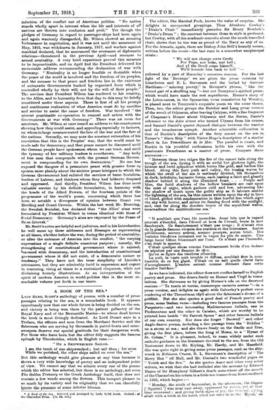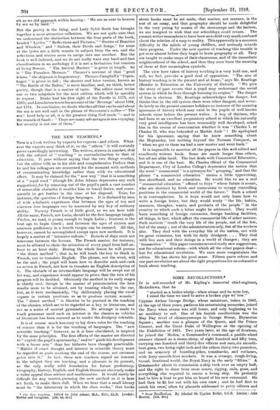A BOOK OF' THE SEA.* LADY SYBIL Scores anthology of
poems, with a number of prose passages relating to the sea, is a remarkable book. It appears opportunely now that our whole future is being decided on the sea, and victory is being won there by the patient gallantry of the Royal Navy and of the Mercantile Marine—to whose dead heroes the book is most fittingly dedioated. As Lord Desert says in a Preface, the (Moors and men from the Merchant Service and the fishermen who are serving by thousands in patrol-boats and mine- sweepers deserve our special gratitude for their dangerous work. For those who have been lost the editor fitly suggests the famous epitaph by Theodorides, which in English rune :— "ON A SHIPWRECKED SA/LOB.
am the tomb of one shipwrecked ; but sail thou ; for even While we perished, the other ships sailed on over the sea."
But this anthology would give pleasure at any time because it Shows a very wide knowledge of poetry and an independent point of view. We cannot say that we admire every one of the poems which the editor has selected, but there is no anthology, not even The Golden Treasury or the Greek Anthology itself, that does not contain a few weeds among the flowers. This bouquet pleases us so much by its variety and its originality that we can cheerfully Ignore the presence of some inferior blooms.
• A Book of the Sea. Selected and Arranged by Lady Sybil Boat. Oxford: at the Clarendon Press, Us. 64. !iota The editor, like Marshal Foch, knows the value of surprise. She delights in unexpected groupings. Thus Abraham Cowley's "Drake's Chair" immediately precedes Sir Henry Newbolt's "Drake's Drum " ; the oontmst between them in style Is profound, but Cowley, with all his academic conceits about the much-travelled chair, shows that he too was as proud of the Navy as any of us. For the Armada, again, there are Bishop John Still's homely verses, written before the event—the last runs in a somewhat unepiseopal strain :
"We will not change owre Credo For Pope, nor bake, nor bell ; And yf the Devil come himself, We'll hounds him back to hell "— followed by a part of Macaulay's sonorous stanzas. For the last fight of the ' Revenge ' we are given the prose versions by Linschoten and R. L. Stevenson and the ballad by Gervase Markham—" mincing poetry," in Hotspur's phrase, "like the forced gait of a shuffling nag "—but not Tennyson's spirited poem, which would have made the rest superfluous. Homer's story of the Lotos-eaters, in the Spenaerian verse translation by 'Worsley, is placed next to Tennyson's exquisite poem on the same theme. Then, too, the editor groups the Butcher and Lang prow version of the wreck of Odysseus, after leaving calypso, with a fine fragment of Chapman's Homer about Odysseus and the Sirens, Dante's reference to the doles siren's who turned Ulysses from his course, and Samuel Daniel's quaint rhymed dialogue between the warrior and the treacherous nymph. Another admirable collocation is that of Ruskin's description of the fiery sunset on the sea in. Turner's "Slave Ship" with Victor Hugo's description of a similar effect in Les Travailleurs de la Mar. The parallel is exact, and Ruskin in his youthful enthusiasm holds his own with the passionate Frenchman as a master of prose. Compare these sentences :— "Between these two ridges the fire of the sunset falls along the
trough of the sea, dyeing it with an awful but glorious light, the Intense and lurid splendour which burns like gold, and bathes like blood. Along this fiery path and valley, the tossing waves by which the swell of the sea is restlessly divided, lift themselves in dark, indefinite, fantastic forme, each coating a faint and ghastly shadow behind it along the illumined foam.. . . Purple and blue, the lurid shadows of the hollow breakers are cast upon the mist of night, which gathers cold and low, advancing like the shadow of death upon the guilty ship as it labours amidst the lightning of the sea, its thin masts written upon the sky in lines of blood, girded with condemnation in that fearful him which signs the sky with horror, and mires its flaming flood with the sunlight,
and, oast far along the desolate heave of the sepulchral waves, incarnadines the multitudinous lea."
"Ilsemblait quo l'esu ffit inoendide. Ansel loin qua le regard pouvait s'etendre, clans rdeueil et hors de l'Aeueil, tante la mer flamboyait. Os flamboiement n'etait pas rouge ; U n'avait rien de la grande Somme vivante des crateres et des fotunsises. Aucnin petillernent, aucune ardour, aueune pourpre, aucun bruit. Des trainees bleuatres imitaient sur la vague les plis de suaire. Une large lueur blame frissonnait sur l'eau. Ce n'etait pas l'inoendie, e'en Atait le spectre. C'etait quelque chose comma l'embrasement livide d'un dedans de sepulore par wee flamme de Wive. Qu'on se figure dee tonebres allumees. La nuit, la vaste Ault trouble et diffuse, semblait etre le oom- bustible de co feu glacsi. C'etait on ne salt goalie clarbe faite d'aveuglement. L'embre entrait oomme element dans cette lumiere fanteme."
As we have indicated, the editor does not confine herself to English poetry and prose. She draws freely on Homer and Virgil in trans- lations. She distresses us by giving Horace's ode on the drowned seaman—" To naafis et terrae, numeroque carentie arenas "—in a prose version, and delights us again with Calverley's perfect verse rendering of the Theooritean idyll about the fisherman's dream of a goldfish. But she also quotes a good deal of French poetry and prose, some Italian verse—including two famous passages from the Purvatorio--and two interesting Mediterranean ballads, one in Piedmontese and the other in Catalan, which are worthy to be printed here beside "Sir Patriek Spans" and other famous ballads of our own country. Nor does she forget " Beowulf " and other Anglo-Saxon poems, including a fine passage from the " Riddles " on a storm at sea ; and she draws freely on the Gaelic: and Erse, giving the first place, before the Song of Moses, to a "Hymn of St. Colum." It is pleasant, indeed, to roam widely under mob catholic guidance in the literature devoted to the sea, from the Old Testament down to Mr. Kipling, Mr. Hardy, and Mr. Masefield. She was quite right in giving some prose passages, such as the ship- wreck in Robinson &woe, R. L. Stevenson's description of "The
Merry Men" off Mull, and Mr. Conrad's two wonderful pages on "Youth and the Sea." As she quotes Aster and other very sober writers, we wish that she had included also the account by Edward Hayes of Sir Humphrey Gilbert's death somewhere off the mouth of the Channel on his return in a little ten-tanner from Newfoundland in 1683, which begins :—
" Monday, the ninth of September, in the afternoon, the frigate Squirrel I was near east away, oppressed by waves, yet at that time recovered ; and giving forth signs of joy, the General, bitting abaft with a book in his hand, cried out unto us in the ' Eyed,' so
eft as we did approach within hearing : We are as near to heaven by sea as by land."
But the poetry is the thing, and Lady Sybil Scott has brought together a most attractive collection. We are not quite sure that we understand the distinction between the four parts of the book, headed " Lyrics," "Reflections and Pictures," "Stories of Beauties and Wonders," and "Sailors, their Deeds and Songs," for some of the lyrics are a little remote in subject from the sea, and the reflections and stories seem to merge into one another. But the book is well indexed, and we do not really want any hard-and-fast classifications in an anthology if it is not a herbarium but consists of living flowers. "The Ancient Mariner " is given at length. So is "The Forsaken Merman." Chaucer's account of that "good felawe " the shipmen is fragmentary. Thomas Campbell's " Copen- hagen " is given in full ; the shorter and later version, known as " The Battle of the Baltic," is more familiar, and, we think, better poetry, though that is a matter of taste. The editor must revise one or two misprints for the next edition which will be speedily in request. Drake had his first sight of the Pacific in 1573, not 1693; and Linschoten wrote his account of the Revenge' about 1594, not 1574. In conclusion, we doubt whether all that can be said about the sea is not well said in the phrase of Stevenson's miller—" The sea ! Lord help us all, it is the greatest thing God made "—and in the remark of Saadi : " Thqre are many advantages in sea-voyaging, but security is not one of them."



































 Previous page
Previous page